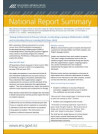This national report is a companion report to Raising achievement in primary schools
It presents further findings of how some of the primary schools were using the Ministry-funded support projects - Accelerated Learning in Mathematics (ALiM) and Accelerated Learninig in Literacy (ALL) to accelerate progress and raise achievement.
Key Results
ERO found that there were four distinct groups of schools of the 93 that had participated in ALiM and ALL.
|
These two groups were effective as the schools responded innovatively to underachievement. |
|
These two groups were less effective as the schools responded with more‑of‑the‑same to underachievement. |
There was a higher proportion of schools in the second and third groups and a lower proportion in the fourth group, when compared with the overall findings of the main report. The group descriptions reflect the ALiM and ALL influence on schools so are slightly different to those in the main report.

